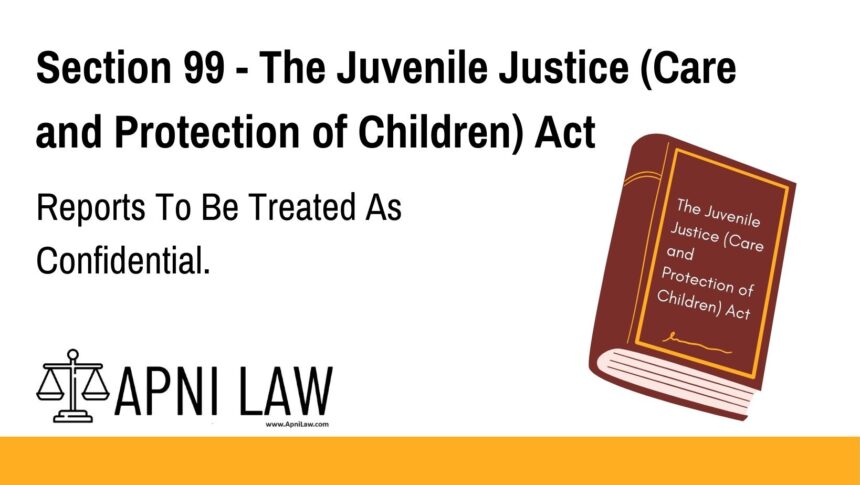Code: Section 99 of the Juvenile Justice (Care and Protection of Children) Act, 2015
(1) All reports related to the child and considered by the Committee or the Board shall be treated as confidential:
Provided that the Committee or the Board, as the case may be, may, if it so thinks fit, communicate the substance thereof to another Committee or Board or to the child or to the child’s parent or guardian, and may give such Committee or the Board or the child or parent or guardian, an opportunity of producing evidence as may be relevant to the matter stated in the report.
(2) Notwithstanding anything contained in this Act, the victim shall not be denied access to their case record, orders and relevant papers.
—
Explanation of Section 99 JJ Act
Section 99 of the Juvenile Justice Act focuses on protecting the confidentiality of reports related to a child involved in legal proceedings. These reports—such as social background assessments, psychological evaluations, or institutional records—are typically reviewed by the Juvenile Justice Board or Child Welfare Committee.
The law mandates that these reports must be kept confidential. However, it allows for limited sharing of information when necessary. For instance, the Committee or Board may share the substance of the reports with the child, their parent or guardian, or another relevant authority if it helps the case or ensures fair hearing.
Importantly, this section also upholds the rights of victims. Even though the child’s records are confidential, victims are allowed full access to case records, orders, and relevant documents.
—
Key Features
- All child-related reports are considered confidential.
- The Board or Committee may share essential content with other authorized persons or bodies.
- Children and their guardians have a right to be informed of key points in the report, especially when relevant evidence is involved.
- Victims are granted access to case records and orders, ensuring their rights are protected.
- This section maintains a balance between protecting a child’s privacy and upholding procedural fairness.
—
Illustration
Example 1: Confidentiality with Limited Disclosure
A child in conflict with law undergoes a psychological assessment, and the report is submitted to the Juvenile Justice Board. The report is kept confidential. However, the Board shares a summary with the child’s parents to help them understand the recommendations and prepare relevant evidence in response.
Example 2: Victim’s Right to Access
In a case involving a juvenile accused of assault, the victim seeks access to the case proceedings and judgment. Under Section 99(2), the victim is legally entitled to receive all relevant papers, orders, and records, even though the child’s case details are protected from the general public.
—
Common Questions and Answers
- Who can access a child’s report under this section?
Only the Board or Committee, and those they authorize—such as the child, parent, guardian, or another Committee or Board—may access the report’s substance. - Are these reports shared with the public?
No. Section 99 ensures complete confidentiality and restricts public access to child-related case reports. - Can the child or parent respond to the contents of the report?
Yes. If the Committee or Board shares any part of the report, the child or guardian has the right to produce relevant evidence in response. - Are victims allowed to see the case files?
Yes. Victims cannot be denied access to case records, orders, or other relevant papers under any circumstance. - Why is confidentiality important in juvenile justice cases?
Confidentiality protects the child’s dignity, ensures privacy, and supports their rehabilitation without public stigma.
—
Conclusion
Section 99 of the Juvenile Justice Act protects the privacy of children involved in legal cases while also ensuring transparency and fairness. It carefully balances the child’s right to confidentiality with the victim’s right to information. By doing so, it strengthens the integrity and sensitivity of juvenile justice proceedings.
To explore more legal explanations and updates, visit ApniLaw.








